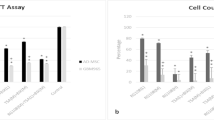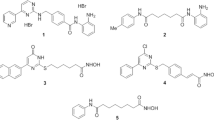Abstract
The discoveries of recent decade showed that all critical changes in cancer cells, such as silencing of tumor-suppressor genes and activation of oncogenes, are caused not only by genetic but also by epigenetic mechanisms. Although epigenetic changes are somatically heritable, in contrast to genetic changes, they are potentially reversible, making them good targets for therapeutic intervention. Covalent modifications of chromatin such as methylation and acetylation of histones and methylation of DNA are the important components of epigenetic machinery. In this study, we investigated the effect of different modulators of DNA and histone covalent-modifying enzymes on the proliferation and viability of normal adult stem cells, such as human bone marrow mesenchymal stem cells (hMSCs), and on malignant tumor cells, such as glioblastoma (GB) D54 cells. Results demonstrated that specific combinations of histone methyltransferases and deacetylases inhibitors significantly attenuated D54 cells viability but having only a small effect on hMSCs growth. Taken together, these studies suggest that specific combinations of histone covalent modifiers could be an effective treatment option for the most aggressive type of primary brain tumors such as glioblastoma multiforme.


Similar content being viewed by others
References
Jones PA, Baylin SB. The epigenomics of cancer. Cell. 2007;128:683–92.
Esteller M. Cancer epigenomics: DNA methylomes and histone-modification maps. Nat Rev Genet. 2007;8:286–98.
Maleszewska M, Kaminska B. Is glioblastoma an epigenetic malignancy? Cancers. 2013;5:1120–39.
Yu DH, Waterland RA, Zhang P, Schady D, Chen MH, Guan Y, et al. Targeted p16(ink4a) epimutation causes tumorigenesis and reduces survival in mice. J Clin Invest. 2014;124:3708–12.
Sasaki H, Matsui Y. Epigenetic events in mammalian germ-cell development: reprogramming and beyond. Nat Rev Genet. 2008;9:129–40.
Kulis M, Esteller M. DNA methylation and cancer. Adv Genet. 2010;70:27–56.
Feinberg A. DNA methylation in cancer: three decades of discovery. Genome Med. 2014;6:36.
Wilson AS, Power BE, Molloy PL. DNA hypomethylation and human diseases. Biochim Biophys Acta. 2007;1775:138–62.
Brueckner B, Kuck D, Lyko F. DNA methyltransferase inhibitors for cancer therapy. Cancer J. 2007;13:17–22.
Gnyszka A, Jastrzebski Z, Flis S. DNA methyltransferase inhibitors and their emerging role in epigenetic therapy of cancer. Anticancer Res. 2013;33:2989–96.
Strahl BD, Allis CD. The language of covalent histone modifications. Nature. 2000;403:41–5.
Sharma S, Kelly TK, Jones PA. Epigenetics in cancer. Carcinogenesis. 2010;31:27–36.
Shi Y. Histone lysine demethylases: emerging roles in development, physiology and disease. Nat Rev Genet. 2007;8:829–33.
Yoo CB, Jones PA. Epigenetic therapy of cancer: past, present and future. Nat Rev Drug Discov. 2006;5:37–50.
Nakagawa M, Oda Y, Eguchi T, Aishima S, Yao T, Hosoi F, et al. Expression profile of class I histone deacetylases in human cancer tissues. Oncol Rep. 2007;18:769–74.
Yang H, Salz T, Zajac-Kaye M, Liao D, Huang S, Qiu Y. Overexpression of histone deacetylases in cancer cells is controlled by interplay of transcription factors and epigenetic modulators. FASEB J: Off Publ Fed Am Soc Exp Biol. 2014;28:4265–79.
Lane AA, Chabner BA. Histone deacetylase inhibitors in cancer therapy. J Clin Oncol. 2009;27:5459–68.
Spannhoff A, Sippl W, Jung M. Cancer treatment of the future: inhibitors of histone methyltransferases. Int J Biochem Cell Biol. 2009;41:4–11.
Giudice FS, Pinto Jr DS, Nor JE, Squarize CH, Castilho RM. Inhibition of histone deacetylase impacts cancer stem cells and induces epithelial-mesenchyme transition of head and neck cancer. PLoS ONE. 2013;8, e58672.
Alexanian AR. Epigenetic modulators promote mesenchymal stem cell phenotype switches. Int J Biochem Cell Biol. 2015;64:190–4.
Alexanian AR, Liu QS, Zhang Z. Enhancing the efficiency of direct reprogramming of human mesenchymal stem cells into mature neuronal-like cells with the combination of small molecule modulators of chromatin modifying enzymes, smad signaling and cyclic adenosine monophosphate levels. Int J Biochem Cell Biol. 2013;45:1633–8.
Funk RT, Alexanian AR. Enhanced dopamine release by mesenchymal stem cells reprogrammed neuronally by the modulators of SMAD signaling, chromatin modifying enzymes, and cyclic adenosine monophosphate levels. Transl Re: J Lab Clin Med. 2013;162:317–23.
Brueckner B, Garcia Boy R, Siedlecki P, Musch T, Kliem HC, Zielenkiewicz P, et al. Epigenetic reactivation of tumor suppressor genes by a novel small-molecule inhibitor of human DNA methyltransferases. Cancer Res. 2005;65:6305–11.
Cui J, Sun W, Hao X, Wei M, Su X, Zhang Y, et al. Ehmt2 inhibitor bix-01294 induces apoptosis through pmaip1-usp9x-mcl1 axis in human bladder cancer cells. Cancer Cell Int. 2015;15:4.
Tao H, Li H, Su Y, Feng D, Wang X, Zhang C, et al. Histone methyltransferase g9a and h3k9 dimethylation inhibit the self-renewal of glioma cancer stem cells. Mol Cell Biochem. 2014;394:23–30.
Hou P, Li Y, Zhang X, Liu C, Guan J, Li H, et al. Pluripotent stem cells induced from mouse somatic cells by small-molecule compounds. Science. 2013;341:651–4.
Suva ML, Riggi N, Janiszewska M, Radovanovic I, Provero P, Stehle JC, et al. Ezh2 is essential for glioblastoma cancer stem cell maintenance. Cancer Res. 2009;69:9211–8.
Colella S, Shen L, Baggerly KA, Issa JP, Krahe R. Sensitive and quantitative universal pyrosequencing methylation analysis of CpG sites. Biotechniques. 2003;35:146–50.
Lopez-Serra P, Esteller M. DNA methylation-associated silencing of tumor-suppressor microRNAs in cancer. Oncogene. 2012;31:1609–22.
Gotze S, Wolter M, Reifenberger G, Muller O, Sievers S. Frequent promoter hypermethylation of Wnt pathway inhibitor genes in malignant astrocytic gliomas. Int J Cancer J int Cancer. 2010;126:2584–93.
Martinez R. Beyond genetics in glioma pathways: the ever-increasing crosstalk between epigenomic and genomic events. J Signals Transduct. 2012;2012:519807.
D’Urso PI, D’Urso OF, Storelli C, Catapano G, Gianfreda CD, Montinaro A, et al. Retrospective protein expression and epigenetic inactivation studies of CDH1 in patients affected by low-grade glioma. J Neuro-Oncol. 2011;104:113–8.
Uhlmann K, Rohde K, Zeller C, Szymas J, Vogel S, Marczinek K, et al. Distinct methylation profiles of glioma subtypes. Int J Cancer J Int Cancer. 2003;106:52–9.
Raynal NJ, Si J, Taby RF, Gharibyan V, Ahmed S, Jelinek J, et al. DNA methylation does not stably lock gene expression but instead serves as a molecular mark for gene silencing memory. Cancer Res. 2012;72:1170–81.
Acknowledgments
This work was supported by VA Medical Research, Fraternal Order of Eagles, and by the Women’s Health Research Program, Falk Medical Research Trust and Frank L. Weyenberg Charitable Trust at the Medical College of Wisconsin. We thank Dr. Bigner for providing us with D-54MG and Kyle Stehlik for technical assistance.
Conflicts of interest
None
Author information
Authors and Affiliations
Corresponding author
Rights and permissions
About this article
Cite this article
Alexanian, A.R., Huang, YW. Specific combinations of the chromatin-modifying enzyme modulators significantly attenuate glioblastoma cell proliferation and viability while exerting minimal effect on normal adult stem cells growth. Tumor Biol. 36, 9067–9072 (2015). https://doi.org/10.1007/s13277-015-3654-1
Received:
Accepted:
Published:
Issue Date:
DOI: https://doi.org/10.1007/s13277-015-3654-1




